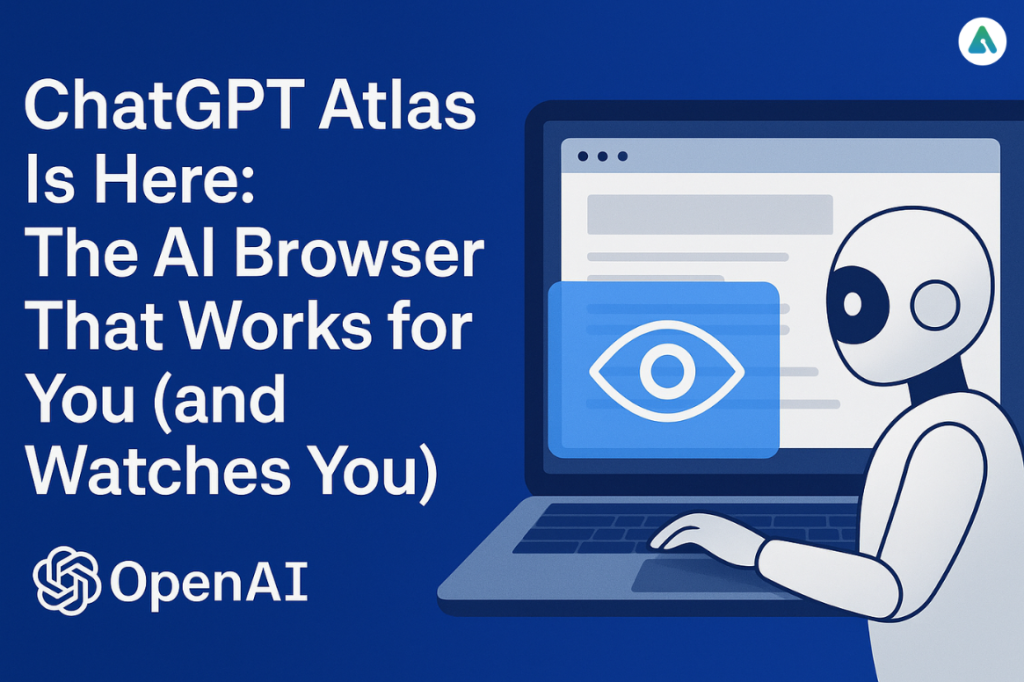OpenAI has officially launched ChatGPT Atlas, a browser that promises to redefine how we interact with the web. Gone are the days of passively clicking through tabs. Atlas doesn’t just display websites—it reads, summarizes, edits, and even performs actions on your behalf, making it feel less like a traditional browser and more like a personal digital assistant.
Released on October 21, 2025, Atlas is available for macOS, with Windows, iOS, and Android versions coming soon. Early reports suggest it could reshape productivity, research, and online workflows—but there’s a catch. The convenience comes with privacy trade-offs and serious security considerations.
What Makes ChatGPT Atlas Truly Different
Atlas is packed with features designed to save time, reduce friction, and make browsing intuitive and interactive:
- Agent Mode: Tell Atlas to book your haircut, order groceries, or send emails—and it does so autonomously. No extra tabs, no copy-paste juggling, just results.
- Real-Time Summaries: Long-winded articles, research papers, or news stories are condensed into clear, digestible insights, letting users absorb information in seconds.
- Inline Editing: Live edits directly on web pages with AI suggestions for tone, style, and grammar—ideal for content creators and professionals.
- Split-Screen Multitasking: Work and chat simultaneously. The AI can assist on one side while you explore or complete tasks on the other.
- Memory & Personalization: Atlas tracks your habits, previous interactions, and preferences, making its assistance smarter over time. Repetitive tasks become effortless.
In essence, Atlas isn’t just browsing—it’s active participation, letting AI handle repetitive or time-consuming tasks while keeping you in control.
The Chrome Context: Why Atlas Gets a Head Start
Timing has given OpenAI a significant advantage. Google plans to roll out agentic AI capabilities via Gemini in Chrome with version 143 on December 2, 2025. That means Chrome users waiting for similar functionality will have to twiddle their thumbs for over a month while Atlas is already performing autonomous tasks.
Currently, Chrome’s Gemini can answer questions or summarize content, but it cannot act independently—no multi-step bookings, no automatic form-filling. Atlas, on the other hand, is fully operational, giving early adopters a real taste of agentic AI today.
Atlas vs. Comet: Early Browser Competition
While ChatGPT Atlas leads in features and polish, it isn’t alone. Perplexity’s Comet browser also offers AI-assisted browsing. Here’s how they compare:
| Feature | Atlas | Comet |
| Agent Mode | Fully autonomous | Limited action-based assistance |
| Summaries | Fast, seamless | Basic summarization |
| Inline Editing | Yes | No |
| Memory | Tracks habits & preferences | Minimal |
| Platform | macOS-first | Cross-platform |
| Security | Vulnerable to prompt injections, slightly higher risk | Vulnerable to prompt injections |
Bottom Line: Atlas is the full-featured option for power users; Comet is easier to try today for casual experimentation.
Convenience Comes at a Cost
OpenAI’s ChatGPT Atlas promises unmatched convenience—but users need to understand the trade-offs. Atlas tracks and stores “memories” of your online activity to personalize suggestions, improve context awareness, and handle tasks efficiently.
While this memory makes the AI feel smarter and more adaptive, it also introduces privacy concerns. Browsing patterns, preferences, and past interactions are stored, creating potential vulnerabilities if a malicious website exploits the browser. Users get proactive assistance—but the cost is letting the AI observe and remember their digital habits.
Clipboard Injection: A Hidden Threat
Security researchers and hobbyists have already uncovered a new vulnerability: clipboard injection. A recent demonstration by X, Twitter user @elder_plinius showed how a malicious website can hide JavaScript that replaces clipboard content with a phishing link. If Atlas’ Agent Mode clicks the element, your clipboard is silently poisoned. Later, pasting can expose you to phishing attacks or malware.
This is not just theoretical. The hack highlights the practical risks of autonomous AI actions combined with persistent memory: anything that can be automated by the agent can potentially be exploited by attackers.
Expert Warnings
Programmer Simon Willison raised alarm bells about Atlas’ security in a recent blog post:
“I’d like to see a deep explanation of the steps Atlas takes to avoid prompt injection attacks. Right now, it looks like the main defense is expecting the user to carefully watch what agent mode is doing at all times!”
Willison called the security and privacy risks associated with browser agents “insurmountably high”, emphasizing that early adopters should exercise caution.
Security and Privacy Considerations
Agentic AI is powerful but risky. In addition to clipboard injections, researchers have highlighted “unseeable prompt injections”, where invisible instructions on a website trick the AI into performing unintended actions. Atlas mitigates some risks by excluding sensitive data like passwords, but persistent memory and autonomous tasks expand the attack surface, making vigilance essential for banking, coding, and other sensitive online activities.
Limitations to Keep in Mind
- Prompt injection risks remain a concern.
- Privacy trade-offs due to persistent memory.
- Potential overreliance on AI reduces independent decision-making.
- Resource demands may impact older devices.
- Early-stage bugs—some features may be incomplete or unstable.
The Future of Browsing
Atlas offers a glimpse of a future where browsers don’t just display pages—they act for you. Early adopters can experience autonomous AI tasks today, while Chrome and Gemini catch up.
It’s a first taste of AI-powered browsing, where your browser actively supports work, shopping, and research—but convenience comes with responsibility. Users must weigh time saved against privacy and security risks.
OpenAI’s ChatGPT Atlas is fast, intelligent, and capable—but it also asks users to trust an AI with their digital habits. For those willing to leap, the future of browsing has arrived.
Visit: AIInsightsNews


